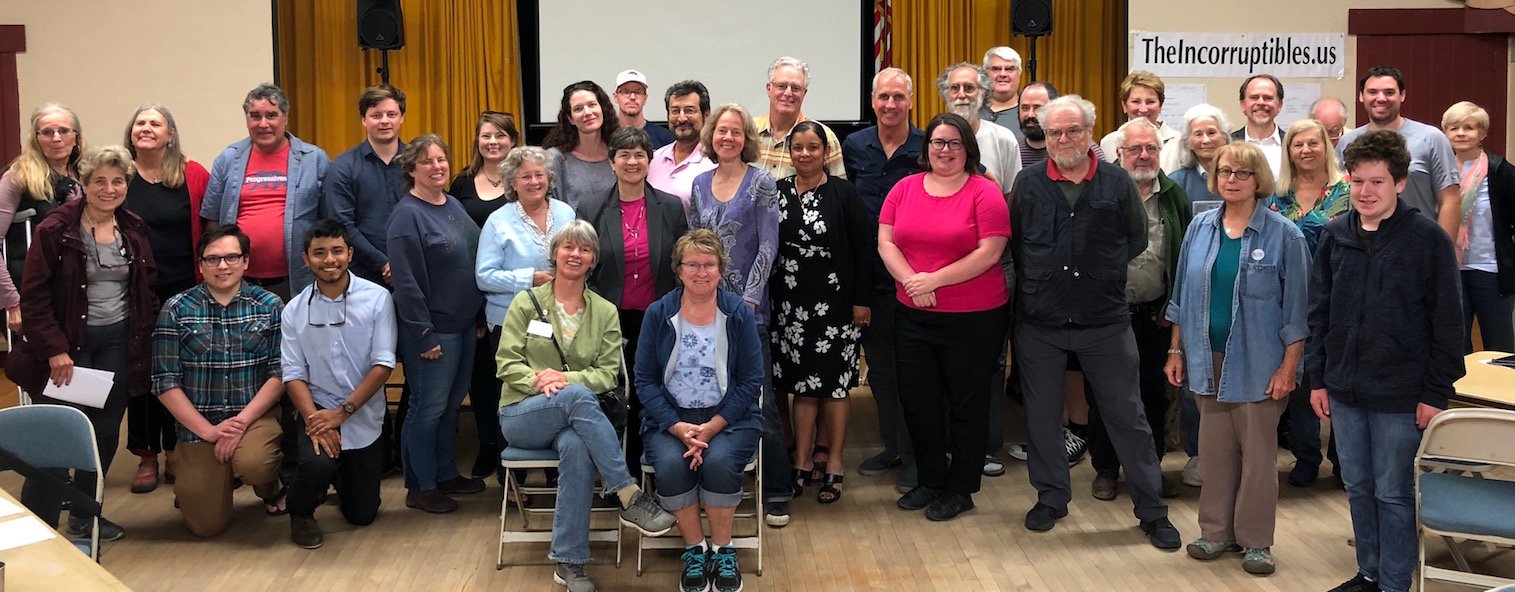What makes Anna unique as a city councilor
There are many types of experience a city councilor can bring to the job. As you consider the different types of knowledge you’d like your seven city councilors to have, I hope you will consider my experience in local and state politics as a good addition to the experience of the other folks who are running for city council.
Starting in 2017, I spent about three years traveling around the country to facilitate workshops on local politics. These workshops were three hours long, most of which the participants spent in small-group discussion. Often these discussions included sitting city councilors or mayors. I facilitated these conversations in about 25 different cities in Oklahoma, northern, central and southern California, Rhode Island, Pennsylvania, Kansas, and Massachusetts. After that our organization moved online and I trained people in cities in eighteen other states for the next couple of years. And for the last couple of years, I’ve been focused on Massachusetts state politics, including running a weekly podcast with two of the most experienced people in progressive state politics.
What have I learned from these last seven years that might make me a better city councilor than if I didn’t have that experience? What do I bring uniquely to the job that other city councilors might know less about?
State law affects a city councilor’s job
The Massachusetts constitution, state law, and previous ballot measures often prevent duly elected city councils and mayors from passing policies their cities need.
Many people think of Republican state legislatures as being bad about “pre-empting” cities from passing policy. Sadly, because of a combination of the state constitution and previous ballot measures, Massachusetts is worse about pre-emption than most states. In Massachusetts we have a few major policy areas where democratically elected city councils and mayors cannot pass policies that their cities need. They have to send a “home rule petition” to the state legislature for approval. In the arenas of workers rights and affordable housing, these home rule petitions are rarely approved. (I’m not getting into the nuance of this in this blog post, so feel free to ask me about it any time, or listen to this podcast we did on it.)
For example, if you want your city councilors to pass any of a variety of policies to protect renters or preserve affordable housing, like a “tenant’s opportunity to purchase” or a small “transfer fee,” all they can do is ask permission and almost certainly get denied. So it’s important to understand what city councilors can and cannot pass.
Additionally, in Massachusetts it’s important for cities to work together if they need affordable housing policies, because we are much more likely to get approval (or enabling legislation) from the state if a bunch of cities pass similar legislation in the same cycle.
Through a statewide nonprofit I have helped assemble a pilot program where experienced lawyers work pro-bono to help city councilors and mayors pass legislation in this way. If we want to make real impact in housing affordability, we have to think regionally and tackle the problems at their root.
Choose whom you hear from
There are plenty of studies that show that the people who are most likely to reach out to their city councilors are wealthier, whiter, more likely to be white-collar workers, and more likely to be homeowners than the average constituent. So if you are a city councilor, and you base your policies on what you hear from people who self-select to reach out to you, then you will be passing policies that meet their needs more than the needs of everyone else.
That’s why it’s so important to choose whom to listen to, and to seek them out and facilitate conversations with people who are not currently engaged in politics. 65% of people in Medford typically do not vote in city elections — and an even larger number never reach out to a city councilor or the mayor. It’s important to seek these people out if you want to properly serve the people in your city and not just get re-elected by the always-voters. (No offense to you always-voters! Thank you for voting!)
Legislating vs listening
I was a software engineer for many years. One thing you learn is that younger engineers always want to write their own code, while more seasoned engineers understand the pitfalls. Home-grown code leads to brittle code that takes fewer edge cases into account and is dependent on the original writer to maintain. It’s better to use existing solutions, whether open source or provided as a service when you can. The same is true with elected officials. Less experienced electeds want to write all their own legislation. Not only does it take many times longer (it can be a steep learning curve) but it is much more likely to be caught up for months in technicalities or to be struck down or hit with a lawsuit later.
Through my statewide work I have a lot of connections to organizations, city councilors, and lawyers across the state that can make this process faster and less risky for our entire city council.
Even more importantly, by getting expert help with legislation you free yourself up to do the more important work of listening and engaging people in making our city better. I’ll probably write another blog post about how to reinvigorate democracy through engagement, but suffice to say I do believe it is the most important job of every elected official.
Our community already knows the solutions
As I have trained people to run for city council, one thing I often see is that candidates think voters want an expert. Candidates think they have to go into the job with all the answers. But the real answers are in the community. There are so many issues that are specific to only one neighborhood or even one street, and more often than not the neighbors have already done the work of meeting, brainstorming, discussing, and perfecting the ideas. Great elected officials do not assume they know the answers — they go to the community for the answers.
City councils move slowly; it takes a team
It’s surprisingly hard to get any policy passed — this is true in every city I’ve interacted with. So if you want change, you’ll need to have a group of city councilors that share the same values. I believe we do need change — in our basic services like roads, trees, and schools, as well as in housing policy, support for local businesses, environmental policy, and more. And since I know that these changes tend to take way longer than people want or expect, I’m excited to join other city councilors who share similar visions of the change we need.
It’s not an elected official’s job to support existing bad policy.
There are times when it’s necessary to push the boundaries of pre-emptive policy. I lived in Berkeley, CA for a couple of years, and while I was there I helped pass public financing of campaigns. I was then appointed to the Fair Campaign Practices Commission and the Open Government Commission to implement that law. We were discussing a detail of the implementation that was struck down in a city in Arizona because the Arizona Supreme Court held that it went against the 1976 US Supreme Court decision (Buckley vs Valeo) that basically said that money is speech. One of the seasoned members of our commission pointed out that it is not our job to uphold a decades-old decision that we think is a bad one. The way we get those decisions overturned is for cities everywhere to pass legislation that makes the Supreme Court reconsider.
So in terms of city councilors and state law, there may be times (like Brookline’s law against new fossil fuel infrastructure) when we should thoughtfully and purposefully pass laws that might push the boundaries of what the state allows us to do.
Respect for all
The best and most beloved city councilors I’ve met are the ones who treat everyone with respect. This includes historically marginalized communities as well as people that don’t agree with them politically. This aligns well with my natural inclination toward respect for and curiosity about everyone’s views.

